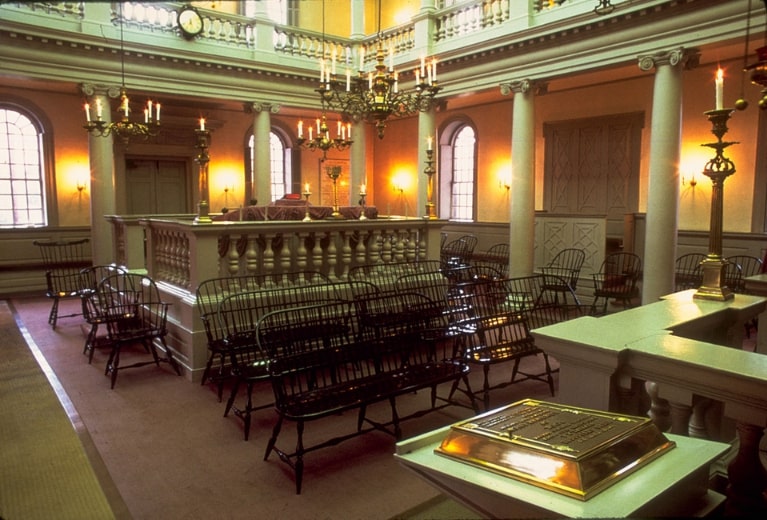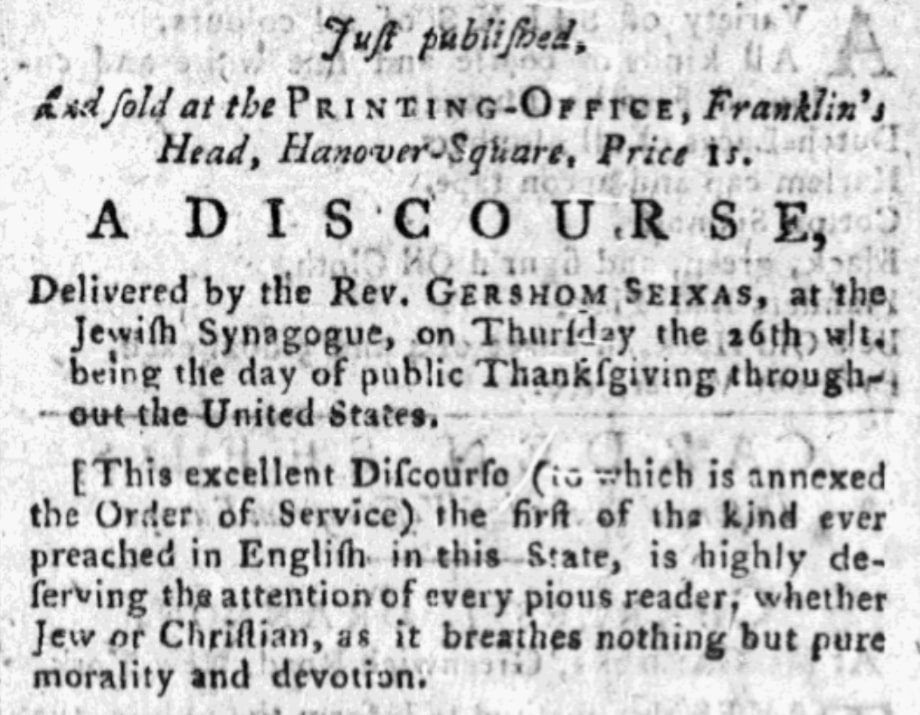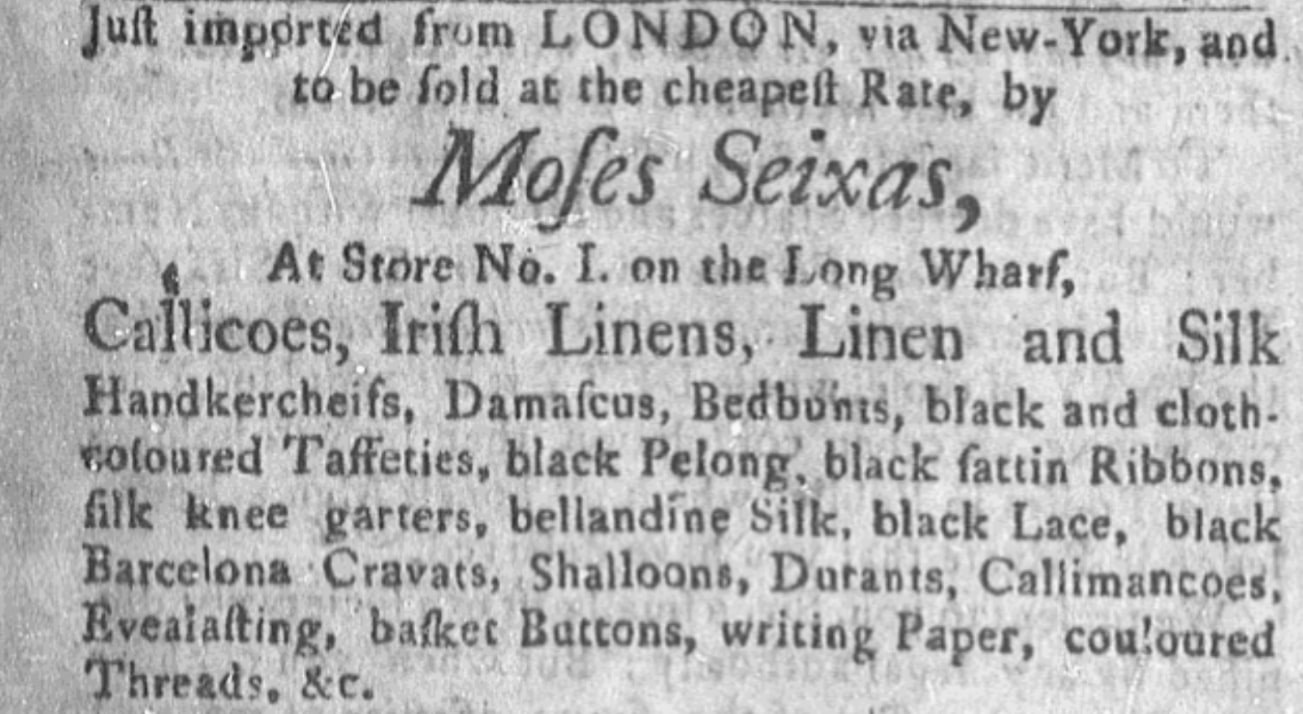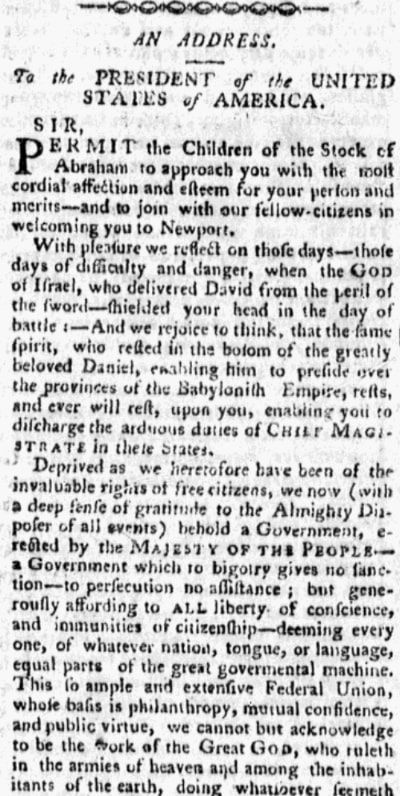Introduction: In this article, Jane Hampton Cook writes about the letter President George Washington wrote to the Jewish congregation in Newport, Rhode Island, in 1790 eloquently affirming America’s commitment to freedom of religion for all. Jane is a presidential historian and author of “War of Lies: When George Washington Was the Target and Propaganda Was the Crime.” Her works can be found at Janecook.com. She is also the host of Red, White, Blue and You
Today, America is home to the second-largest Jewish population in the world, comprised of 5.8 million Jewish adults – which is 2.4 percent of the U.S. population. GenealogyBank’s Historical Newspaper Archives allow researchers to discover some of the stories of early Jewish immigrants who came to America for a better life. Articles in Rhode Island newspapers and others from the mid to late 1700s show the triumphs of Jews whose families escaped anti-Semitism and persecution in Europe.

One such family was the Seixas family. Abraham Seixas was a Jew who lived in Portugal in 1720. At this time, Jews were forced to convert to Catholicism and forbidden from practicing their faith. The Inquisition sent government officials to the houses of Jews who committed the “crimes” of fasting or secretly feasting on Jewish holidays.
Those who were found guilty were forced to wear cone-shaped hats or were imprisoned and in many cases, executed. When Inquisition officials visited Abraham Seixas’s house, he hid in a laundry basket at the suggestion of his servant. Seixas subsequently fled to England and arranged for his family to join him. They first migrated to Barbados, then to New York, and ultimately, Rhode Island.
By the 1790s, two of his grandsons, Gershom and Moses Seixas, were leading citizens in their towns. Living in New York City, Gershom became the first rabbi in New York City to lead his congregation in English. In March 1790, he became a published author for his 1789 Thanksgiving sermon.
“This excellent discourse” was advertised in the New-York Daily Gazette as “highly deserving the attention of every pious reader, whether Jew or Christian, as it breathes nothing but pure morality and devotion.” Gershom had also attended the inauguration of President George Washington in New York City in April 1789.

His older brother Moses Seixas lived in Newport, Rhode Island, where he operated a store on the long wharf. In May 1768, he advertised recent imports that he had received from London, including “calicoes, Irish linens, linen and silk handkerchiefs.” Over the years, he helped to establish the Bank of Rhode Island. He also actively participated in something that his grandfather Abraham didn’t have in Portugal: a synagogue.

In 1790, Moses served as the president (warden) of Newport’s Touro Synagogue – built in 1763, it is the oldest surviving synagogue in the U.S. In this role, he helped make presidential history. When President George Washington decided to visit Rhode Island in honor of their recent ratification of the U.S. Constitution, Moses seized the opportunity. In sharp contrast to his grandfather Abraham, who was forced to hide from Portugal’s government officials when they visited his home, Moses openly welcomed President Washington.
Moses wrote a letter to President Washington on 17 August 1790, expressing his congregation’s support and good wishes, that was published in the Newport Herald.

The letter read in part:
“Permit the children of the stock of Abraham to approach you with the most cordial affection and esteem for your person and merits – and to join with our fellow citizens in welcoming you to Newport.”
Moses compared the difficulties that General Washington had faced during the Revolutionary War with well-known stories in the Bible.
“With pleasure we reflect on those days – those days of difficulty and danger, when the God of Israel, who delivered David from the peril of the sword, shielded your head in the day of battle. And we rejoice to think that the same spirit, who rested in the bosom of the greatly beloved Daniel, enabling him to preside over the provinces of the Babylonish Empire, rests, and ever will rest, upon you, enabling you to discharge the arduous duties of Chief Magistrate in these States.”
Understanding that not only had King George III deprived him of his rights, but that the Portuguese Inquisition had also deprived his grandfather of religious liberty, Moses showed his appreciation for America.
“Deprived as we heretofore have been of the invaluable rights of free citizens, we now (with a deep sense of gratitude to the Almighty disposer of all events) behold a government, erected by the majesty of the people – a government which to bigotry gives no sanction, to persecution no assistance – but generously affording to all liberty of conscience, and immunities of citizenship; deeming every one, of whatever nation, tongue, or language, equal parts of the great governmental machine. This so ample and extensive federal union, whose basis is philanthropy, mutual confidence, and public virtue, we cannot but acknowledge to be the work of the Great God, who ruleth in the armies of heaven and among the inhabitants of the earth, doing whatsoever seemeth him good.”
He concluded with giving thanks to God.
“For all the blessings of civil and religious liberty which we enjoy under an equal and benign administration, we desire to send up our thanks to the Ancient of Days, the great preserver of men – beseeching him, that the angel who conducted our forefathers through the wilderness into the promised land, may graciously conduct you through all the difficulties and dangers of this mortal life; and when, like Joshua, full of days and full of honor, you are gathered to your Fathers, may you be admitted into the heavenly paradise to partake of the water of life, and the tree of immortality.”
The next day, 18 August 1790, President Washington wrote a formal response to Moses Seixas and his congregation entitled “To the Hebrew Congregation in Newport, Rhode Island.” Responding with similar wording to Moses’ letter, President Washington purposefully pointed out that religious liberty in America extended to Jews.
“The citizens of the United States of America have a right to applaud themselves for having given to mankind examples of an enlarged and liberal policy: a policy worthy of imitation. All possess alike liberty of conscience and immunities of citizenship. It is now no more that toleration is spoken of, as if it was by the indulgence of one class of people, that another enjoyed the exercise of their inherent natural rights. For happily the government of the United States, which gives to bigotry no sanction, to persecution no assistance, requires only that they who live under its protection should demean themselves as good citizens, in giving it on all occasions their effectual support.”
Washington was gracious and humble.
“It would be inconsistent with the frankness of my character not to avow that I am pleased with your favorable opinion of my administration, and fervent wishes for my felicity.”
Then Washington proclaimed a blessing.
“May the children of the stock of Abraham, who dwell in this land, continue to merit and enjoy the good will of the other inhabitants; while everyone shall sit in safety under his own vine and fig tree, and there shall be none to make him afraid. May the father of all mercies scatter light and not darkness in our paths, and make us all in our several vocations useful here, and in his own due time and way everlastingly happy.”
Washington believed that religious liberty was an important freedom. Through this message to the synagogue in Rhode Island, George Washington set the example that America would be a place of freedom and not a place for an anti-Semitic inquisition.
Every summer, in an annual celebration, a noteworthy speaker is chosen to read President Washington’s letter aloud to the congregation in Touro Synagogue.
Explore over 330 years of newspapers and historical records in GenealogyBank. Discover your family story! Start a 7-Day Free Trial
Note on the header image: Touro Synagogue and gardens. The oldest synagogue in America, built in 1763, it is an active synagogue and is located in the historic district of Newport, Rhode Island. Credit: Zellner55; Wikimedia Commons.
Related Article:
